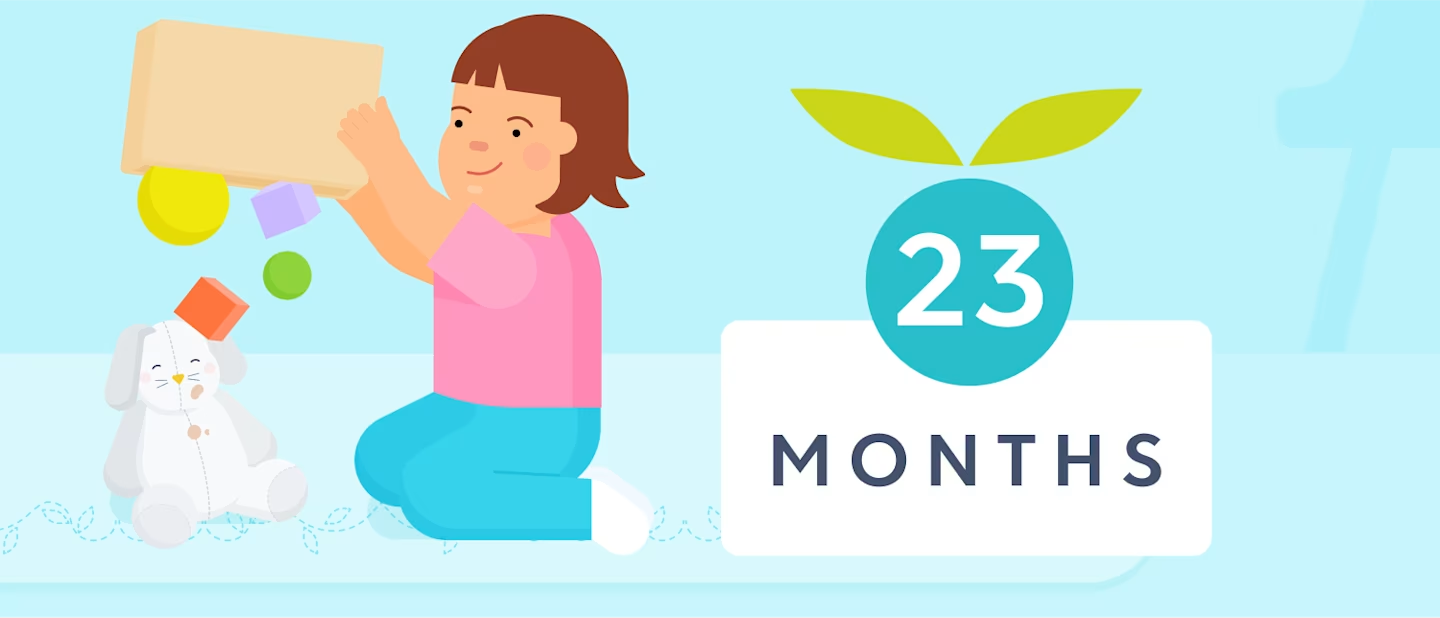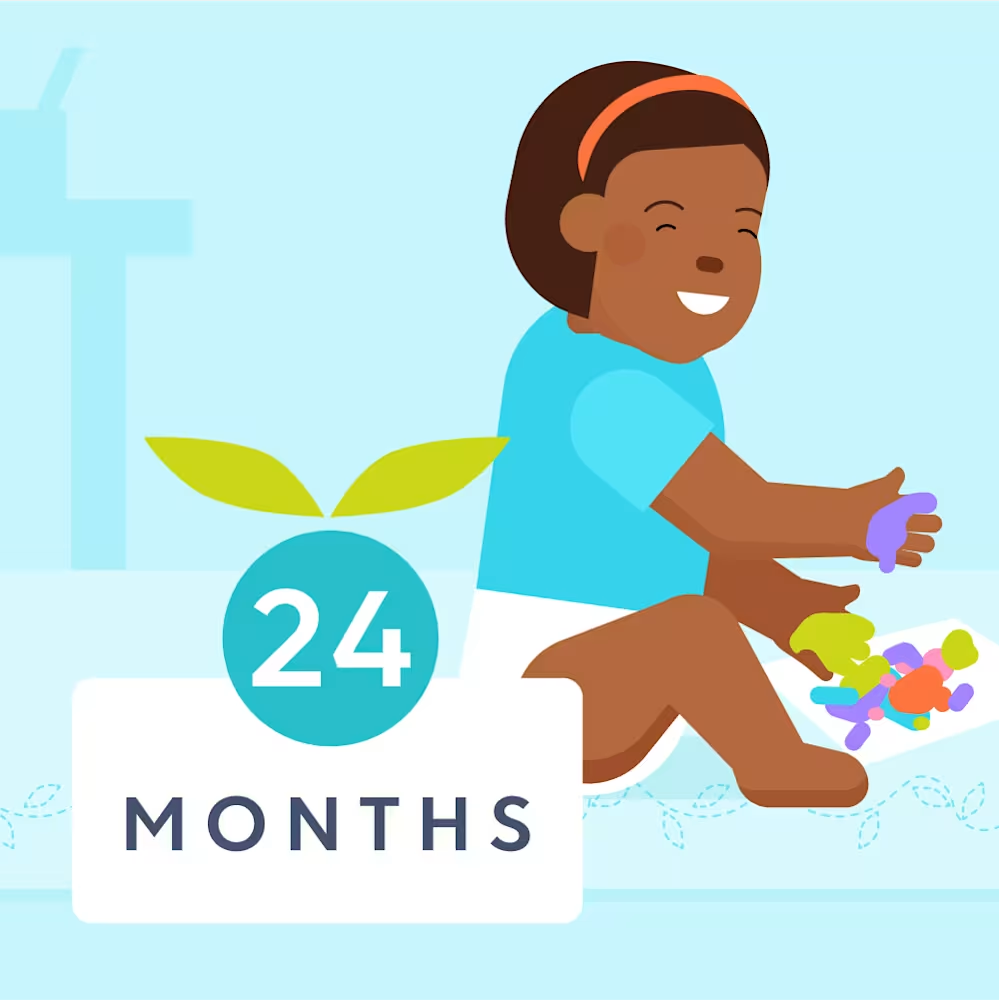23 month old sleep schedule: Bedtime and nap schedule
Updated Dec 15, 2025

Is your little one resisting falling asleep at bedtime? At 23 months, this is often due to a combination of needing a longer wake window before bed and independence-seeking behaviors.
If you find that your 23 month old would prefer to throw everything out of their crib instead of laying down to sleep, take comfort in knowing that the behavior is developmentally appropriate. (It's also understandably frustrating!) This desire for independence is a natural part of child development and allows your toddler to practice problem-solving skills. Ensuring your child is well-rested will help them have the patience and energy to succeed.
How much should a 23 month old sleep?
At 23 months old (adjusted), we recommend aiming for about 12.5 hours of total sleep per day (about 10 - 12 hours at night and 1.5 - 2.5 hours of day sleep in 1 nap). Most children do well with a set schedule that allows for about 5.25 - 5.75 hours of awake time in between sleep periods at this age.
Here's a quick overview of what you may expect when it comes to 23 month olds and sleep. Note that these figures are averages and should be used as guidelines.
Top sleep tip for 23 month olds
Try describing your sleep routine for toddlers in terms of “first, next, last,” to help set limits at bedtime. For example, you might say, “First we’ll brush your teeth, then we’ll change into pajamas, and last, we’ll read a book before I kiss you goodnight.” When your child knows what to expect during their routine, it can help cut down on.
Sample 23 month old sleep schedule

Note: Sleep needs vary by child and this chart should be viewed as an example.
Morning rise: 7:00 AM
Wake window before nap: 5.25 hours
Nap: 12:15 PM - 2:15 PM (2 hour nap)
Get ready for bed: 7:15 PM
Wake window before bedtime: 5.75 hours
Asleep: 8:00 PM
Naptime schedule for a 23 month old
Most 23 month olds need a daily nap. We find that one midday nap that typically allows for around 5.25 - 5.75 hours of awake time on both sides of the nap works well. However, if your child needs more or less awake time before sleeping, that’s OK too! Find the schedule that works best for your kiddo and stick with it.
How many naps for a 23 month old?
Most kiddos on the verge of 2 do best with 1 midday nap. Although kids this age may skip their nap occasionally, they typically aren’t ready to fully drop the last nap until at least 3 years of age. Pro tip: Serve lunch before the nap to help ensure that your toddler doesn’t wake early from hunger.
How long should a 23 month old nap?
At 23 months old, most toddlers nap for about 1.5 to 2.5 hours each day. At this age, a consistent schedule with about 5.25 to 5.75 hours of awake time between sleep periods usually works best. The longest stretch of awake time often happens after the nap, leading up to bedtime.
If your toddler skips a nap (or takes a very short one) try to keep bedtime as close to the usual time as possible to help stay in sync with their circadian rhythm. However, if your little one is really struggling to make it that far (especially after a few days of missed or short naps), it’s a good idea to offer an earlier bedtime to prevent them from becoming overtired.
1-nap schedule
1-nap schedule with short nap/early bedtime

Bedtime for a 23 month old
What time should a 23 month old go to bed?
Ideally, your 23 month old will get about 10 to 12 hours of sleep at night, which usually puts bedtime around 12 to 14 hours after they wake up — assuming they’ve had a good nap. If the nap is skipped or very short, try to keep bedtime close to the usual time to stay aligned with their internal clock. But if your toddler is really struggling to make it that long, especially after a few days of short or missed naps, it’s okay to shift bedtime a bit earlier to help prevent overtiredness and keep nighttime sleep on track.
Toddlers often take longer to settle down at bedtime — their busy little minds (and hands and feet) can take a while to quiet. It can be helpful to lengthen your pre-bedtime sleep routine by 10 - 15 minutes if your kiddo has been taking a long time (more 20 minutes) to fall asleep. Try reading another book or quietly working on a puzzle together in dim light to give them the additional time needed to help wind down before bed and allow for sufficient melatonin production (the hormone that helps control when they fall asleep) [].
Is there a sleep regression at 23 months?
You’ve probably googled the “.” While we often see new sleep struggles around 24 months due to factors like the development of limit-testing, separation anxiety, and life changes (e.g. potty training or new siblings), there’s no magical date on the calendar when all kids this age will fall into a bout of poor sleep. Sleep regressions can happen at any age.
However, if your child is around 2 and is experiencing new sleep challenges, with a solid sleep foundation and some patience on your part, these phases are usually temporary.
Why does my 23 month old keep waking up at night crying?
Some kiddos go through a rough patch of sleep around their second birthday. Some factors that may contribute to bumpy sleep include:
Separation anxiety
Illness
Parent-led sleep associations
Seeking independence
Mastering milestones
Teething
If you’re looking for more sleep support, consider submitting for a personalized, step-by-step Sleep Plan via .
Can my 23 month old sleep with a pacifier?
Many parents worry about the long-term effects of pacifier use, especially beyond age 2. The good news is that dental issues typically don’t become a concern until permanent teeth begin to emerge. Some experts suggest starting to phase out the pacifier around age 3, though the AAP notes that most children won’t need any treatment for pacifier-related concerns until age 5 [].
Can a 23 month old sleep on their stomach or side?
By 23 months, your child can safely sleep on their stomach or side if they roll there on their own and can roll both ways. Allowing your toddler to choose their sleep position is typical and healthy at this stage.
Can I sleep train a 23 month old?
Sleep training can be a helpful tool to teach your independently without needing to be rocked, patted, or fed. The key is that aligns with your child’s temperament and your parenting style. Not all approaches involve “cry it out” — some are more gradual and gentle, while others may lead to quicker results but involve more tears initially (usually short-term!).
What are the developmental milestones for a 23 month old?
At 23 months, here are some things your child may be trying or doing. Keep in mind all toddlers develop at their own pace — your kiddo may not be doing all of these things yet and that’s OK.
Uses two- to four-word sentences
Follows simple instructions
Begins make-believe play
Sorts objects by shapes and colors
Eats with a spoon (19 - 24 months)
Starts to jump with both feet leaving the ground
Climbs on low furniture
Walks up and down stairs (with support)
Stands on tiptoes
Can pull toys behind them while walking alone
Flips switches on and off, turn knobs, and press buttons
Scribbles
Stacks 5+ or more small blocks or toys
Takes toys apart and puts them back together
Follows two-step directions
Consistently imitates new words
Does a 23 month old need to eat during the night?
Most 23 month olds no longer need to eat during the night. But if your child had an early dinner and is waking up hungry overnight or very early asking for food, try offering a healthy bedtime snack or shifting dinner a bit later. A full tummy can help your little one sleep more soundly through the night!
Takeaway
We recommend aiming for around 12.5 hours of total sleep in a 24-hour period to help your little one stay well-rested. This usually breaks down to 10 – 12 hours at night and 1.5 – 2.5 hours during the day
Most 23 month olds still benefit from one daily nap. If your toddler starts resisting naptime, try pushing it a bit later rather than cutting it out completely.
If your toddler is resisting their bedtime routine, try describing it in terms of “first, next, last,” to help set limits at bedtime. When your child knows what to expect during their routine, it can help cut down on.
If you're curious about what lies ahead in the coming month, glimpse into the future to see what you might experience once your baby is on a . Also check out a to see how far your little one has come.
Share article:
Note: The content on this site is for informational purposes only and should not replace medical advice from your doctor, pediatrician, or medical professional. If you have questions or concerns, you should contact a medical professional.
2 Sources
Share article:






